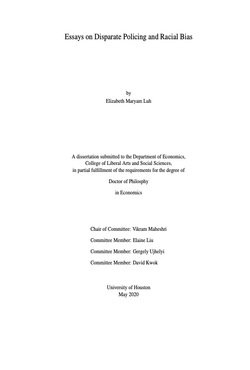Essays on Disparate Policing and Racial Bias
By Elizabeth M. Luh
This dissertation contains two essays on disparate treatment in policing. The first chapter links this disparate treatment to bias in the context of highway trooper's stop and search decision. Highway police officers, or troopers, may misreport the race of people that they engage with in order to evade detection of racial bias. I propose a new test of racial bias in the presence of misreporting that is well-suited to explore the rich heterogeneity in bias behavior. Using a unique event in Texas where troopers were caught deliberately misreporting minority motorists as white, I find bias against all minority motorists, but especially against Hispanic motorists. I estimate bias for each trooper and find that over 30\% of troopers were engaging in this behavior. Using my trooper level measure of bias, I identify causal relationships between bias and labor outcomes using a panel data set of trooper employment outcomes. I show misreporting was used effectively to evade detection of bias, with bias having no effect on labor market outcomes when the misreporting was possible. I find that after a rule change to trooper stop recording policy in response to the misreporting led to negative labor outcomes for biased troopers, specifically, lower rates of promotion and had lower salary growth. I further test how individual trooper bias changes in response to changes in peer, demographic compositions. In particular, black or Hispanic troopers are sensitive to changes in peer composition, while white troopers are unaffected. The second chapter tests whether police officers disparately enforce parking…..
-
tickets across black and non-black neighborhoods. Using a plausibly exogenous increase in the fine for failing to purchase annual vehicle registration in 2012, colloquially known as the sticker tax, I test if Chicago police disparately enforced parking compliance across black and non-black neighborhoods from 2007 to 2017. I find that police behavior is responsive to the penalty structure of the fine and are 20 to 50 percent more likely to apply the sticker fine to black neighborhoods after the increase. This disparate enforcement is robust to employment controls and is not driven by changing compliance rates across neighborhoods. In contrast, I find that parking enforcement agents do not disparately enforce the tickets across black and non-black neighborhoods. I attribute this difference in behavior between parking enforcement agents and police officers to the lack of ticket quotas for police officers. Since police officers are not evaluated by their parking citation productivity, they do not behave as revenue-maximizing agents.
Houston, TX: University of Houston, Department of Economics, 2020. 103p.


